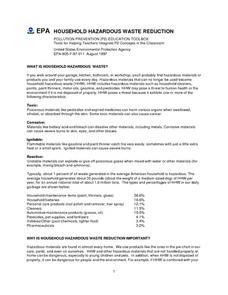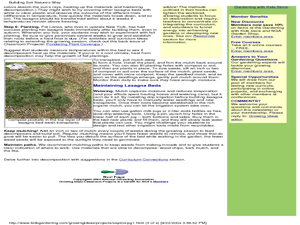Curated OER
Organic and Inorganic Waste
Learners conduct a scientific investigation about organic or inorganic waste. In this organic or inorganic waste lesson, students create a compost heap to determine the difference between inorganic and organic waste. Learners...
Science Teachers
Organ Systems Crossword Puzzle
An attractive and informative body systems crossword plus its answer key is provided for your life science learners. The topic is the organs. With 23 prompts to address, they are sure to get a complete review in identifying the systems...
Curated OER
Solid Waste and Recycling
Students demonstrate effects of waste on environment and ways of reducing it, observe how much packaging goes into bag lunches each day, and survey their families to assess awareness levels and household recycling practices. Lessons all...
Curated OER
What's Organic?
Students discuss background information presented by the teacher and read dictionary definitions for the words "organic" and "synthetic." In this gardengin lesson, students complete a worksheet on the material. Students grow and compare...
Curated OER
Classifying Waste: What Kind is Mine?
Students discover what happens to their trash and garbage once it is collected off of the curb. In groups, they classify garbage and waste into seven different categories and estimate how much waste is created in each one. Using the...
Curated OER
Kidney Structure and Function: removing intracellular waste
Your class will learn all about the function of the kidney and how it operates in animals from different habitats. The methods of absorption, filtering and excretion are detailed and pupils will learn of the different...
K12 Reader
Tissues, Organs and Systems
Young scientists are introduced to the connections among cells, tissues, organs, and systems in a life science reading comprehension worksheet that asks them to respond to a series of questions based on the passage.
Curated OER
Household Hazardous Waste Reduction
Students discover the different types of hazardous waste. They examine ways to dispose of the hazardous materials safely and without harming the environment.
Curated OER
Building Soil Nature's Way: Exploring decomposition and soil health
Students explore decomposition and soil health by creating their own garden. In this agriculture activity, students build a "lasagna garden" with organic matter found in the area and plant perennials native to their region....
Bonneville
Compost Bioreactor Design
Organic waste is a hot topic. The second of three installments in the Bioreactor Water Heating unit challenges pupils to create bioreactors that collect energy released from compost. After watching videos on the properties of water and...
Teach Engineering
Life Cycles
Breathe some life into product design. Pupils learn about the stages of product creation, use, and disposal—sometimes called a cradle-to-grave assessment. They see how this cycle relates to the life cycle of organisms.
Curated OER
What's Organic?
Students define and discuss terms organic and synthetic, read article pertaining to organic agricultural practices in Oklahoma, complete worksheet, grow plants using both commercial and organic fertilizer, compare growth rates, and chart...
Curated OER
Organ Systems: Excretory, Digestive, Immune, and Nervous
Eighth graders identify and describe the components of various body systems. They create vocabulary flash cards identifying the excretory, digestive, immune, and nervous systems and describing their functions. Students complete a...
Curated OER
Gallery Walk Questions on Weathering and Mass Wasting
A set of questions on weathering and erosion are found in this resource. Some of them can be used as discussion topics or lecture guides. There are also suggested activities such as the examination of topographic quadrangles and the...
Curated OER
Garbage/Solid Waste Disposal
Students examine the problem of solid waste disposal in modern society. They decide on a site for waste disposal. They investigate the many different types of waste that need to be dealt with. They participate in three learning station...
Curated OER
Vermiculture Food Waste Compost Program for Touchstone School
Young scholars explore the advantages of composting. In this recycling instructional activity students complete a worm compost project and collect food waste to feed them.
Curated OER
Organs and What They Do - Lecture
Students read information about the internal organs and body systems. In this organs and systems lesson, students read descriptions of the heart, lungs, stomach, small and large intestine, and liver and gall bladder. Students study...
Curated OER
Solid Waste and Our Natural Resources: Utilizing the Story THE LORAX
Students gain an introduction to our planet's solid waste problem and our personal responsibility in curbing and solving said problem through the use of Dr. Seuss' book, The Lorax. After hearing the book, class discussion follows.
Curated OER
Human Organ Systems
In this human organ systems worksheet, students write the organ system that is described in the first 5 sentences. Students match the body parts to the organ system and write them in the chart.
Curated OER
Slash Trash! Reducing, Reusing and Recycling Our Way to Zero Waste
The other "Three Rs" are covered in this lesson: reduce, reuse, and recycle. Over four weeks, conservationists collect data about waste in their own homes. They combine their findings with those of other young scholars in order to...
Curated OER
Organic and Inorganic Recycling
Learners examine their role in polluting the environment and discuss the importance of recycling. In groups, they place earthworms into compost piles to observe why they are considered natural recyclers. They also practice sorting a...
Curated OER
School Yard Waste
Fourth graders examine the types of garbage that they collect on the playground. They collect the information in a spreadsheet and create a graph that displays the number of types of trash found. They design and monitor a playground...
Curated OER
Urban Ecosystems 4: Metabolism of Urban Ecosystems
Cities are compared to living, breathing, metabolizing organisms. Fourth in a five-part series of lessons, this one focuses on the flow of materials through a city. Links to interesting websites and images make your delivery of...
National Park Service
Reduce Our Carbon Footprint, Let’s Compost!
Roll up your sleeves and get a little dirty with this elementary and middle school compost instructional activity. All you need is a large plastic container, a couple old newspapers, some organic waste, and a few hundred worms and...

























